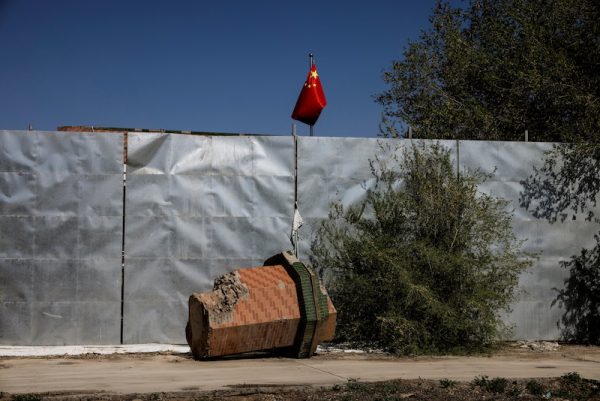The People’s Republic of China’s (PRC) minority policies have been evolving since 1949, but forced linguistic and cultural assimilation campaigns last peaked during the Cultural Revolution. In its early years, the PRC adopted the Soviet model of multinational state-building, in which being ‘Chinese’ meant ‘socialist in content while nationalist in form’. Minorities could maintain their indigenous languages and cultures in their autonomous areas so long as they remained loyal to the PRC.
Since the Soviet Union’s collapse in 1991, China gradually switched to a Chinese model of a unified Chinese nation with diversity, largely imitating the US model. This model aims to assimilate minorities into the Chinese mainstream through economic development and cultural inclusion. The government is targeting the economic gap between minority communities and the majority Han ethnicity by opening up Western China while dispatching minorities to work in coastal China.
The cultural inclusion is theoretically two-way, requiring minorities to learn Mandarin and Han culture while elevating minority cultures as part of a unified Chinese culture in state television programs and at events such as the opening ceremony of the 2008 Beijing Olympics. But some question whether China can become a melting pot. The Chinese model started to come under pressure during the leadership of Xi’s predecessor, Hu Jintao, due to ethnic riots in Xinjiang and self-immolation protests in Tibet in 2009.
Shortly after succeeding Hu, Xi began showcasing what the unified Chinese nation should look like under his reign. At the Second Work Conference on Xinjiang in May 2014, he asked ethnic groups to develop an awareness of the state, citizenship and community of the unified Chinese nation. At the Sixth Work Conference on Tibet in 2015, he said this awareness involves five identifications: with the state, the unified Chinese nation, Chinese culture, the Party and Chinese socialism.
All aspects of Xi’s minority policies were elevated as a single working slogan, ‘to forge the awareness of the community of the unified Chinese nation’, a principle further espoused in an amendment to the PRC Constitution in 2018. The impact of this new policy is demonstrated in Xi’s speech at the Third Work Conference on Xinjiang in September 2020. There he told officials that, of the five identifications, Chinese culture is the most fundamental. Xi’s policy has been understood and implemented by the Chinese government in three essential ways.
First, learning to speak Mandarin is considered critical in the identification with the unified Chinese nation. In recent years, minorities in Xinjiang, Inner Mongolia, Tibet and other minority communities have been coerced into learning Mandarin. Resistance to this approach leads to punishments, including re-education camps, detentions, job loss and financial retribution. Bilingual teaching and research has become a political taboo in Xinjiang and other minority areas, with the government forcing academic journals on the topic to close and scholars to instead research Mandarin education.
Second, Chinese culture is understood as being that of the Han majority culture, and it is increasingly criminal to suggest otherwise. The documentary The War in the Shadows describes how editors and publishers associated with Uyghur and Kazakh language textbooks for primary and secondary schools were recently sentenced to death or life in prison. Their alleged crime is to have included in the textbooks a high percentage of indigenous material and readings regarding historic figures who were not from today’s China or who rebelled against Han oppressors.
Third, earlier this year, the Legal Affairs Committee of the National People’s Congress ruled unconstitutional any items in local autonomous laws which support the use of minority languages in local schools as a medium of instruction. In their first constitutionality ruling, the committee accused them of violating the constitutional article on Putonghua promotion.
These headlines are just the tip of the iceberg of China’s coercive and accelerated assimilation program. Under Xi, the country is becoming not so much a melting pot as a pressure cooker.
Minglang Zhou is Professor of Chinese Studies and Director of the Chinese Program and the Center for East Asian Studies at the University of Maryland, College Park.


First of all, this article really lacks intellectual merit, either intentionally or not. Wondering why public schools in the United States force the students to study English? We should condemn it too.
I am also very curious why the Chinese government should exempt the Uyghurs and other minorities from their One-Child policy, as they are accused of Uyghur genocide?
Aren’t they supposed to discourage these minorities and oppress their population?
I am equally baffled by the sloppy CCP “minorities cultural genocide” strategy as they’re promoting their languages on Renminbi currency notes and I think some denominations even promote cultural figures of the minorities. It’s foolish.
Also, why is the Chinese government so silly as to restore or build so many mosques in Xinjiang, and throughout the country?
Lastly, why is the CCP so ineffective in its “genocide efforts” and has it allowed the Uyghur population to grow and prosper until now?
In my opinion, if the accusations about CCP are true, then I would advise the US government and all its western allies to help the CCP with a ‘Genocide 101’ course because they are certainly darn good at it, judging from their colonial history.